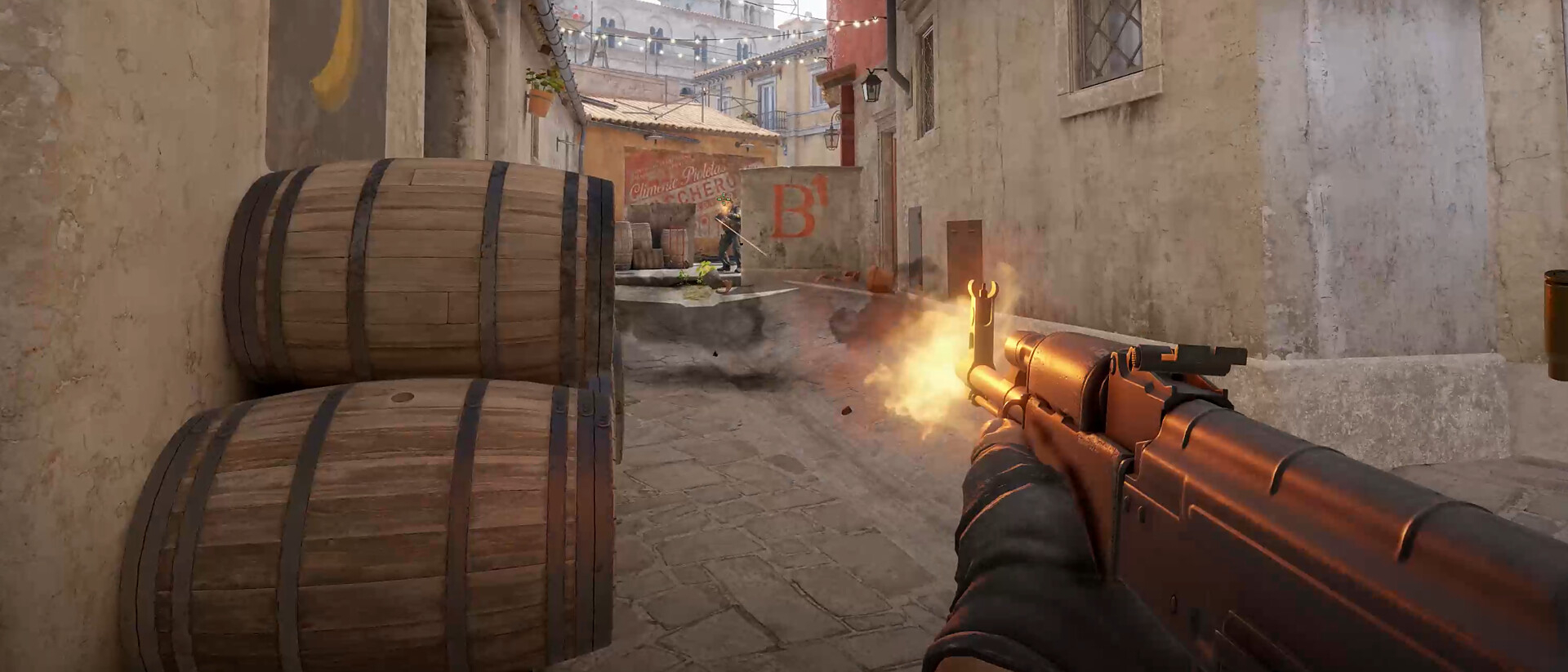TechRadar Verdict
Counter-Strike 2’s wall of noise and violence will feel impenetrable to newcomers but a welcome upgrade for long-term Counter-Strike fans. It’s the best competitive shooter on the market, but it’s so difficult for new players to get on board that it won’t be for everyone.
Pros
- +
Mechanically clean
- +
Beautiful art direction
- +
CS:GO skins have all been ported over
Cons
- -
Unfriendly to newcomers
- -
A few weird quirks
Why you can trust TechRadar
Platform reviewed: PC
Available on: PC
Release date: Out now
Counter-Strike 2 doesn’t care about you. Over the course of hundreds of rounds in this multiplayer first-person shooter, I’ve been shot, blown up, and burnt in ways that feel savagely unfair. But the secret is that I am barely competent at Counter-Strike 2, and Valve’s newest competitive shooter really doesn’t care about making me feel welcomed.
If you want success, you have to earn it. Bizarrely, dropping an enemy with a well-placed headshot actually feels more satisfying because it’s just that rare to get a sympathy kill. More often than not, I spent my time with CS2 getting picked off with a single round by people with better motor skills or more hours with the game than me.
So it goes. Counter-Strike has always been viciously cruel to newcomers. As a pioneer of the one-life-per-round multiplayer shooter, the game has long been about five-on-five multiplayer matches that see combatants slowly whittled down as the round draws on. Casual game modes up the player count substantially, but that feeling of attrition as players get wiped out, littering the map with their corpses, remains.
The two teams, terrorists and counter-terrorists, fight over a bombsite or a few kidnapped hostages: opposing objectives that see one or the other team taking a defensive angle while the other tries to bust in and complete their objective. In most competitive settings, these games will all involve the bomb defusal mode, which revolves around counter-terrorists trying to hold a bomb site while terrorists try to attack it, planting the bomb and holding it for 40 seconds before it explodes, killing everyone nearby.
War Economy
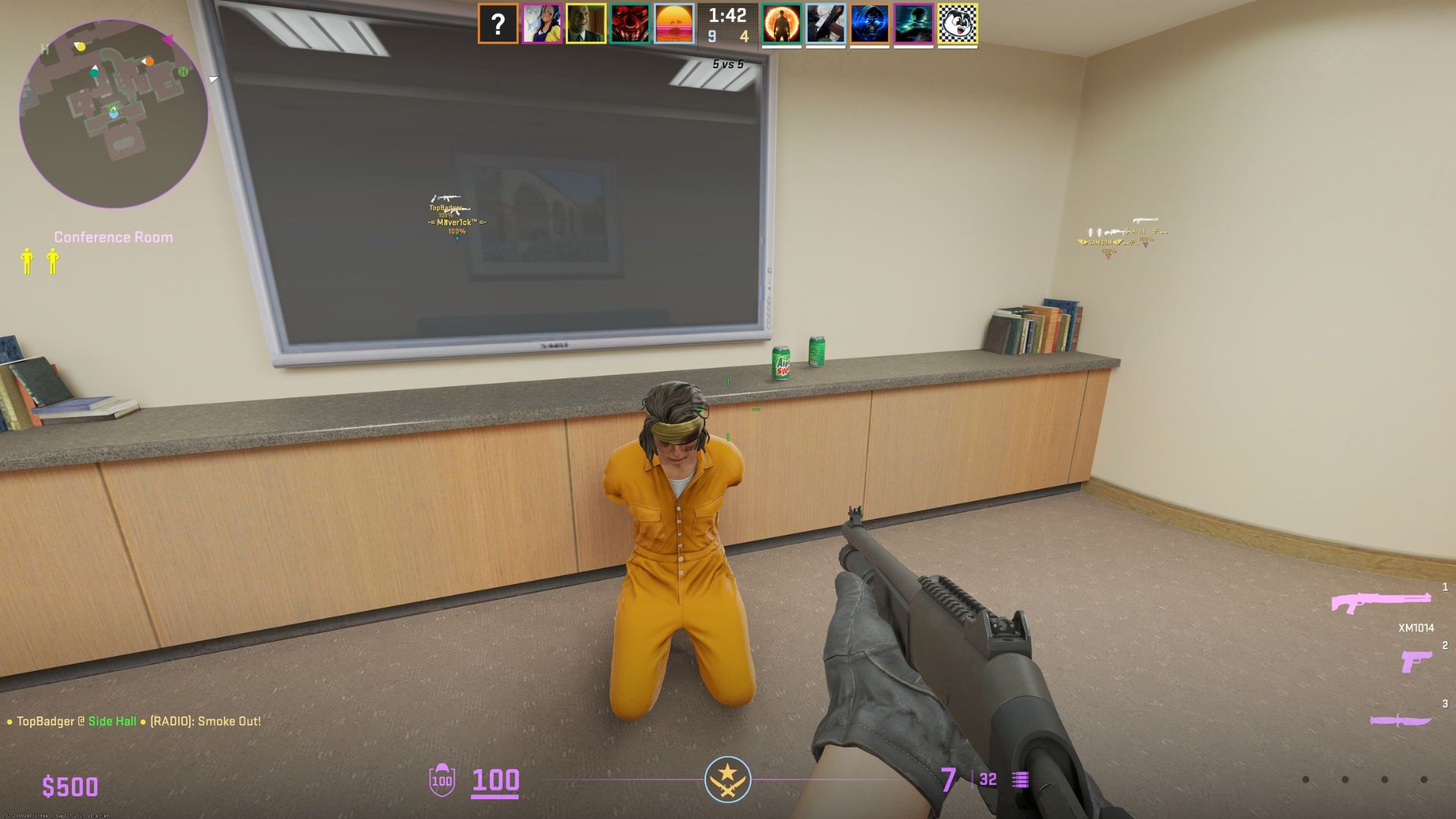
The need to buy your weapons each time you respawn punctuates the round-by-round ultraviolence with a bit of meta-strategy, as the more powerful weapons cost more money and will require you to complete objectives and kill enemies just to pay your upkeep. The AWP, a godless killing machine that can end any player in a single hit, is so expensive that you’ll have to perform well through multiple rounds to get it, and when you die there’s a good chance the opposing team will try to scoop it up for themselves, turning it back on you in the next round.
This is, by and large, how it has always been in Counter-Strike and very little has changed with Counter-Strike 2. Yes, there’s beautiful smoke now, and there's a subtick system that I don’t really understand that has the community divided, but in practice doesn’t seem to impact casual play too much. The M4A1-S will look a little different, but it’s the same game, remade in Valve’s Source 2 engine. This is why it’s called Counter-Strike 2 of course (if you were somehow confused as to why the fourth game in the series is numbered 2).
But if you’ve played Counter-Strike Global Offensive - the previous entry that Valve has made the baffling decision to hide away in a beta branch now, the better to replace it entirely with CS2 - then you’re still going to be good at this new entry. If you’re not, you’re going to have to bang your head against a wall made of players with better skills than you if you want to get better.
Stick and move
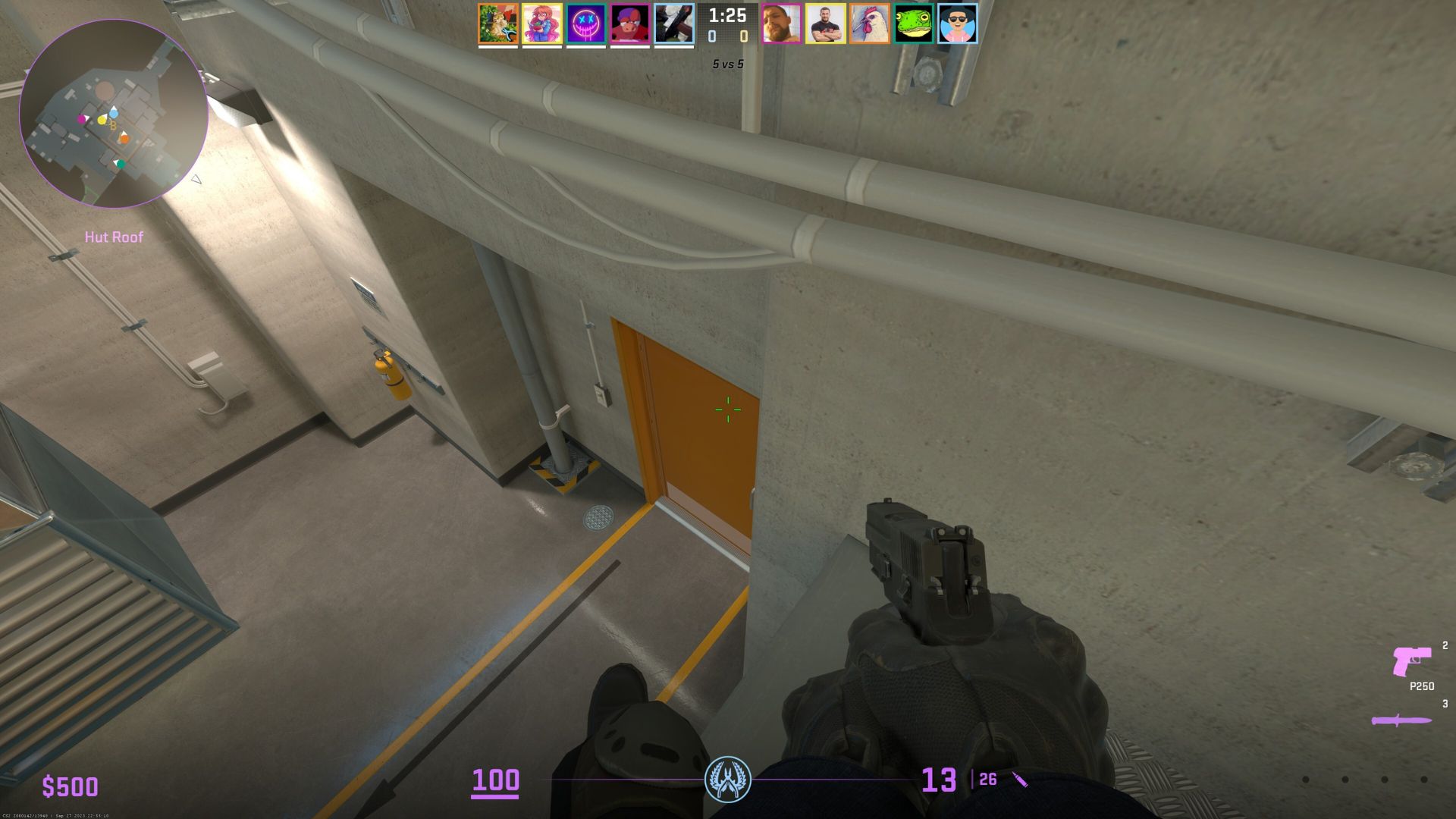
The draw is the silken movement and clean gunplay. Moving around in Counter-Strike 2 is smooth and fast. Hidden paths through the somewhat remastered maps open up for anyone able to master a crouch jump, and you’ll soon find yourself cutting through the maps at high speed. Move at full speed and you’re noisy, walk and you move slower but you’re quieter. Crouch and you’ll move incredibly slowly, but make nearly no noise. The slower you move, the more accurate your guns are, so you’re making a constant trade-off between moving fast and noisy and moving slow and stealthy, poised to attack.
The only time you lose that control is when you’re shot by an enemy, with the impact of bullets slowing you down, all but guaranteeing your death. Unless you kill your attacker first. This is a simple and elegant way that CS2 pushes you, endlessly, toward violence. While several of the one-life competitive shooters will see people slowly trading damage over the course of a round, here most fights will end with someone dying as few angles provide the luxury of an escape route or a reposition while you’re moving at a snail’s pace.
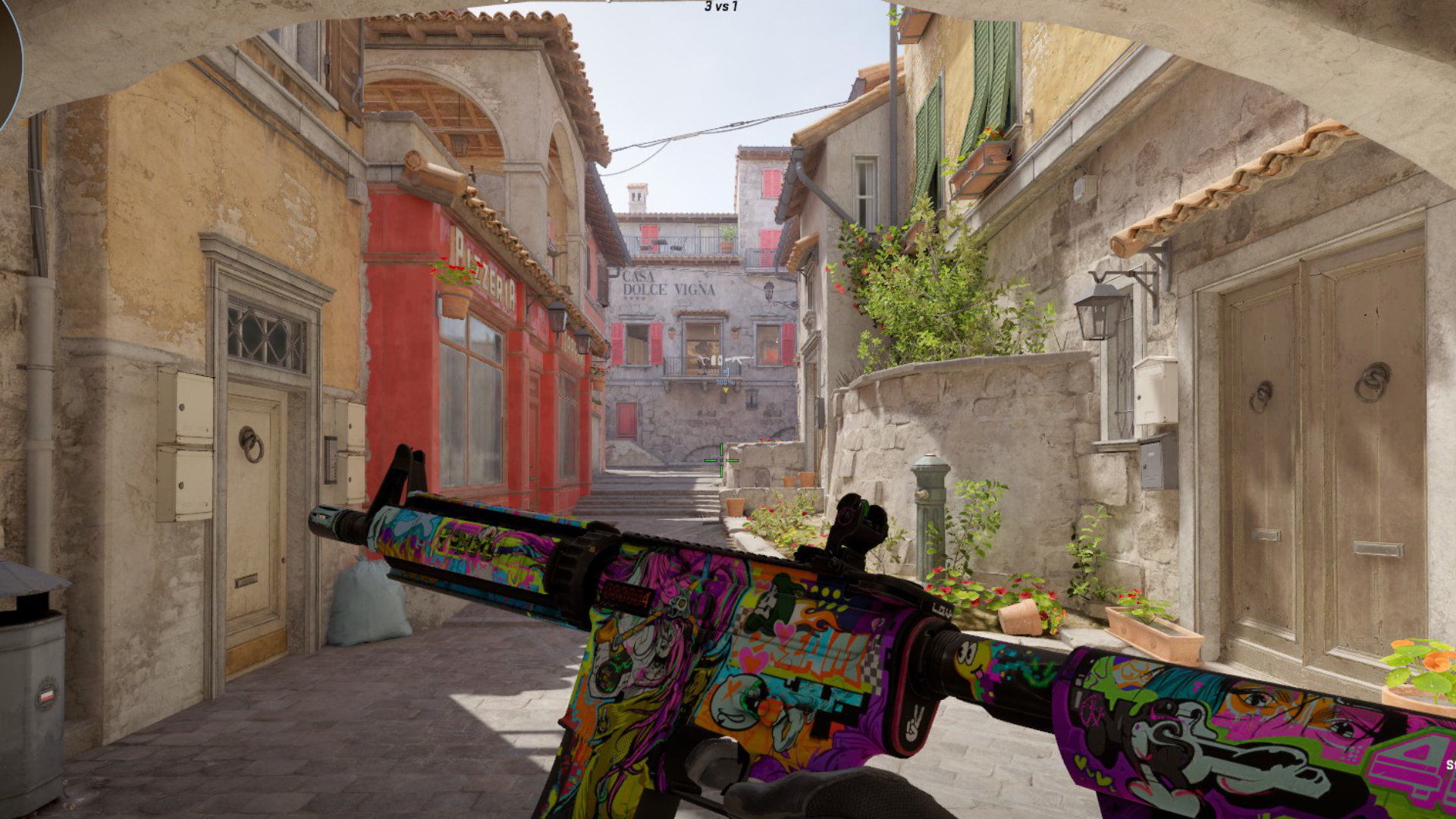
Executing the perfect flank and getting a couple of kills to win a round always feels good. The time I did it on Overpass to kill two people with a USP-S, including the absolute bad guy who had been one-hitting me with a sniper rifle every single round? Bliss.
The weapons you’ll play with are diverse and interesting: an MP5SD will spray down enemies up close with barely any recoil, while an M4A1-S is a long-range killing machine, providing you can manage your recoil. The buying wheel of CS:GO is gone, replaced with a Valorant-esque buying grid. There are more weapons in the game than slots to display them, so players will have to choose the weapons they’re most likely to use.
Each weapon behaves slightly differently. So despite how often it kills me, I find the AK47 unusable, though I’m capable of picking people off all day with the MP5SD or the bullet-hose P90. Both guns are more forgiving to people, like me, who haven’t yet internalized Counter-Strike 2’s golden rule: you should stop moving to fire.
While most people will be wearing armor in each fight, gunfights are still fairly brutal. The damage model isn’t as vicious as Escape From Tarkov or even Rainbow Six Siege but aiming skill is highly valued and most of the time a fight will be over in a split second, a burst of gunfire eviscerating the loser before they have time to react.
Get good or die trying
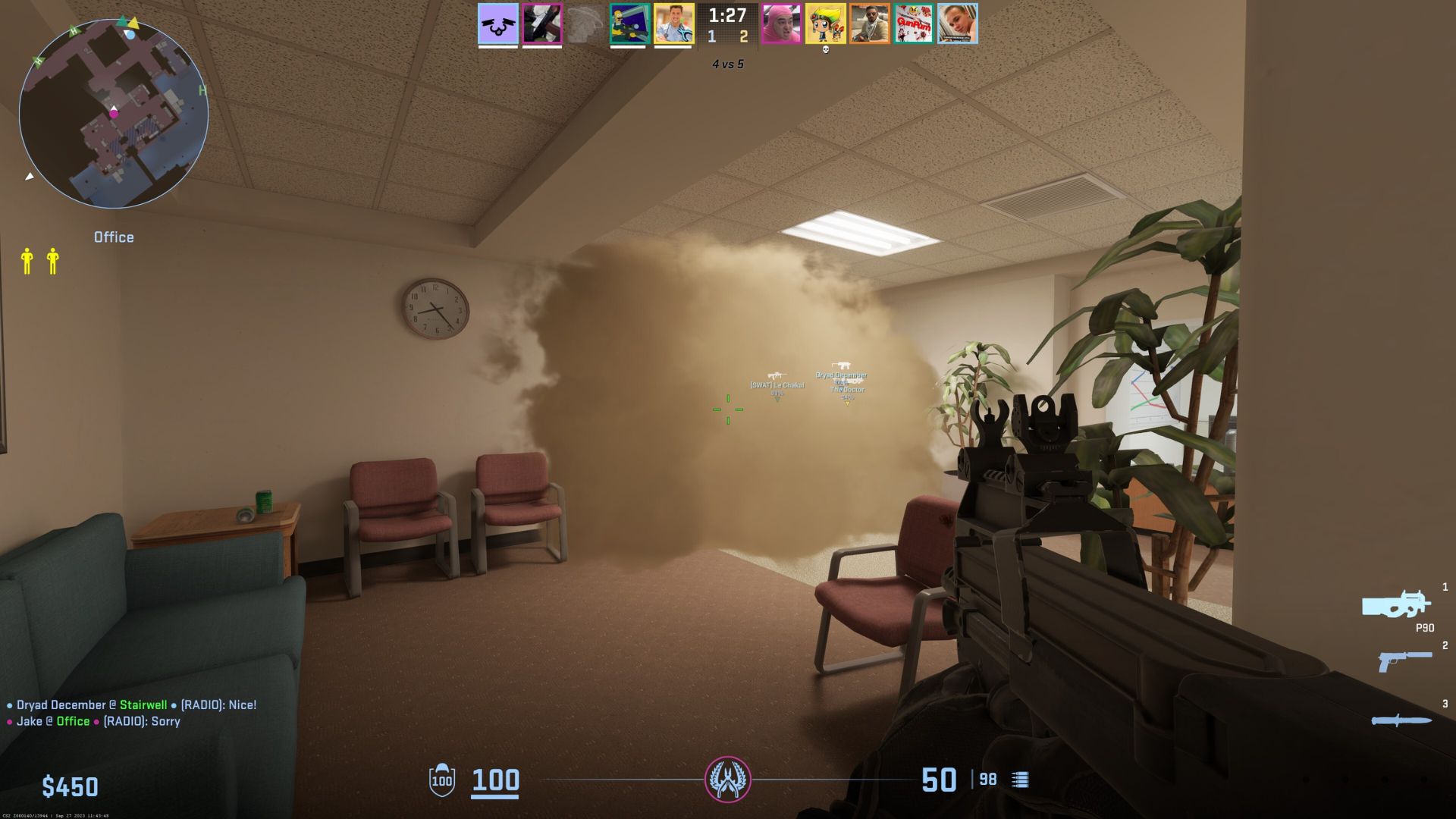
There is, however, something compelling about this. To win even a single fight here means you’ve outplayed an opponent. To hold an angle feels heroic, reloading a tiny celebration of living another few seconds. I’ve clutched a couple of rounds, but success in Counter-Strike has always evaded me. Counter-Strike 2 is no different, but I view getting success here as aspirational; so much fun do I find the tiny conflicts that make up each round.
Sadly, I think I may be in the minority. Despite some features to make the game a little easier to learn, I think most people’s first 100 hours are going to be miserable and it’s hard to know who’s going to put all of that time in to actually get some skills. Especially when these skills will be hard-won and forged in the fires of, well, getting torn apart by talented players who have already suffered through those early hours.
Counter-Strike 2 is an exceptional game. But it’s impenetrable and hostile to newcomers and it’s upset a lot of its existing player base by replacing a much-loved game with a newer version that will need a nicer PC for people to play and has cut out some of the beloved features from CS:GO.
This doesn’t impact whether or not Counter-Strike 2 is a good game. It’s excellent. But the manner of its release is somewhat baffling and has meant that while I am writing the review, I’m writing this as a review of Counter-Strike 2 as it stands right now. But there’s a storm coming, and I think the version of Counter-Strike 2 that we play a year from now, six months from now, a month from now… is going to be entirely different. I hope those changes morph Counter-Strike 2 for the better.
Accessibility
Outside of subtitles, really there’s nothing to talk about here. A poor showing.
How we reviewed Counter-Strike 2
I played 30 hours of Counter-Strike 2, across the game’s competitive and casual modes. I also dabbled in the game’s deathmatch mode and the two vs. two wingman mode. These feel like sideshows so I didn’t spend a lot of time with them, putting an hour into each before focussing entirely on the main event, which for me is the five-on-five multiplayer.
I spent all of the time playing on keyboard and mouse. I’m currently using Razer’s Cobra Pro, and that worked just fine here.
The best FPS games promise more high-stakes action, but the best co-op games may also be of interest for a more communal setting.

Jake Tucker is the editor in chief of TechRadar Gaming and has worked at sites like NME, MCV, Trusted Reviews and many more. He collects vinyl, likes first-person shooters and turn-based tactics titles, but hates writing bios. Jake currently lives in London, and is bouncing around the city trying to eat at all of the nice restaurants.
